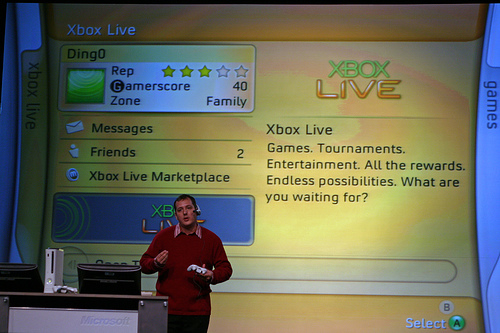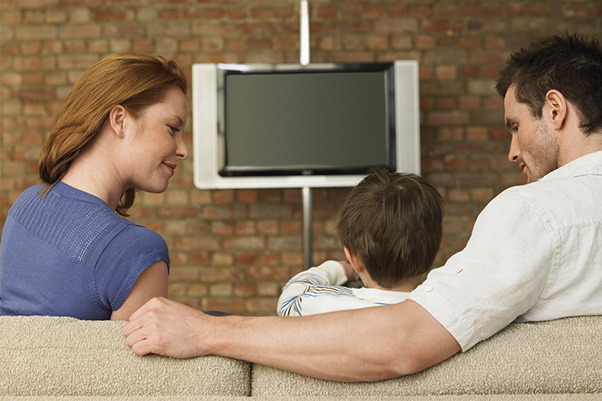The onslaught of digital duress may be stripping back the fabric of your family. It is no secret that in this age of digital everything, digital parenting has leapfrogged over so many other more traditional means of parenting. Although digital parenting is a necessary adaptation, it's important for families to strengthen communication before technology.
Read More »Is This Donut a Secret Message From Your Kid?
The issue with parenting in the digital age is that it moves at the speed of light, and kids are at the very forefront of it. They know about the latest apps weeks, perhaps months before you do, and they are quietly discussing who-knows-what with their friends via texting apps and Facebook messenger. The age of being able to eavesdrop on a conversation and get all the knowledge you ever needed is over.
While those days are over, we’ve developed a new way to keep up with our kids, and digital parents need digital weapons. With that being said, kids are starting to get a bit wise to the ways of the digital parent.
Read More »Lessons Learned from Cyberbullying
Unwelcome sexting, abusive text messages, digital public humiliation and social media harassment all fall under the umbrella of cyberbullying. The sobering realities of cyberbullying have become so prevalent that the Federal Bureau of Investigation (FBI) published a "Cyberbullying and Sexting: Law Enforcement Perceptions" bulletin advising agencies that "94 percent of school resource officers agreed that cyberbullying was a serious problem warranting a law enforcement response."
Sexting Is Just the Beginning
With the relatively new ability to send images and videos through technology, people of all ages are taking advantage of this ability to connect to others. Unfortunately, it has also led to the evolution of “sexting.” While this is legal for adults (but still risky), it is not for minors and can have serious consequences on a minor’s emotional state, not to mention their professional and academic future.
Depending on the minor, the situation in which the sexting occurs, and how it is handled, the ramifications can vary greatly. However, it almost always leads to some negative effects for the teen.
What It Can Lead To
While parents may be aware of certain repercussions of sexting, there are a wide variety of consequences that even the most conscientious parents may not be aware of. Regrettably, it can lead to the following negative effects:Digital Parenting: 11 Facts About Cyberbullying
Cyberbullying is defined as a young person tormenting, threatening, harassing, or embarrassing another young person using the Internet or other technologies, like cell phones. The psychological and emotional outcomes of cyberbullying are similar to those of real-life bullying. The difference is, real-life bullying often ends when school ends. For cyberbullying, there is no escape. And, it’s getting worse. Read on to get the facts.
Calculator or Hidden App? Teens Are Disguising Content With Apps
In this day and age teenagers are more tech savvy than most adults. They chat on their smartphones with their peers, download all the popular apps and are greatly familiar with their device settings. Another recent thing that a lot of teens do on their smartphones is hide pictures, messages and apps. Find out how teens are doing this and discover what you should be looking for on teens' phones.
Hiding Apps
The most popular way to hide apps or any other content on your phone is by using an app that does that. Both Apple Store and Google Play have a lot of hiding apps for download and the majority of them are free.
Read More »Could Your Child Be an Online 'Troll'? But What Is Trolling?
“Trolling” is making inflammatory, anonymous statements on the Internet for the sole purpose of derailing an online discussion or provoking the other participants in the discussion. In other words, another way for kids to participate in cyberbullying. A troll, in Internet lingo, is somebody who does these things online. Often times you might encounter this image when searching for a “troll”:
Is My Child Watching Pornography Online?
When we think of people who are consumers of online porn, we automatically picture grown adults. However, with access to pornographic sites becoming increasingly widespread, a large number of tweens and teens are believed to have viewed some kind of online porn.
How Many Children Are Watching Porn?
Today, it's reported that at least 90 percent of kids between the ages of 8 and 16 have watched pornography online at least once. Not only have most tweens and teens seen porn, but boys ages 12 to 17 are actually the largest consumers of online pornography. With this statistic, pornography has even been compared to being the drug of choice for youth.
Read More »6 Requirements for Managing Peer Pressure Among Kids/Teens
Peer pressure can be extremely hard to deal with for kids and teens. It becomes increasingly difficult without the support of their parents. When it comes to managing peer pressure among kids/teens, there are things that you should do, and things that you must do. Here are six such "musts" for dealing with peer pressure:
-
Talk to your child about the dangers of drugs, alcohol and sex: Talking to your child opens up a dialogue that can be very important. If your child feels safe discussing these difficult topics with you, there is a greater chance that they will come to you if they are curious about trying them.
10 Things Parents Need to Know About Xbox LIVE and Kids Safety
Xbox LIVE is the online service for the Xbox 360. With a paid gold membership and a set of headphones, your child can play online with a community of 40 million other users worldwide.
This can be seriously awesome for the gaming enthusiast in your house, but there are 10 important things parents should know about Xbox LIVE and keeping kids safe before setting it up for their child.
-
It's more than just a gaming site. Xbox LIVE users can also chat with each other, send and receive friend requests, and share their profile and gaming stats.
Understanding Cyberbullying: Why It Happens and How To Prevent It
In recent years, the news media coverage has exploded with tragic stories and consequences of cyberbullying. Cyberbullying is defined as bullying that occurs over electronic devices, often through texting, email or through social media websites such as Facebook. Bullies can send hurtful messages to other children, post embarrassing pictures of their peers on facebook, or send hateful email messages.
Cyberbullying takes on the same form as face to face bullying. The cyberbully will have a clear intent to harm the victim (either emotionally or by threatening them with physical harm), perceivable aggression in the messages, and a perceived or obvious imbalance of power over the victim by the cyberbully.
The abuse that children endure at the hands of cyberbullies leave many parents, teachers, and guardians wondering what causes the bullying to happen in the first place. Cyberbullies engage in harmful behaviors towards their peers for many reasons:
-
The cyberbully wants to feel powerful
10 Reasons to Monitor Your Child's Internet Activity
Some moms, dads, and grandparents I know get a little squeamish about parental monitoring. Are they invading their teen's privacy?
When it comes down to it, parental monitoring isn't about privacy, it's about safety. Here are 10 reasons for every parent to start monitoring their child's Internet activity.
Teaching Children About Internet Security Right From The Start
There is never a time too early in the life of a child to start thinking about Internet security. Children of younger and younger ages are starting to get a glimpse into the world of the Internet, and many are potentially at risk if they are not informed of what they should and should not do.
Have A Conversation
Before you ever get into the technical aspects of what you can do to keep your child safe online, it is a good idea to simply have a conversation with them. You can explain to them the steps to take if they are confronted by someone online that they do not know.
Read More »Long Term Effects Of Bullying On The Victim
Bullying has often been considered as something that some children experience at some point in their lives. However, with the Internet and smartphones, bullying has been elevated to an extremely sophisticated type of social harassment. New studies are showing that bullying can have negative effects that last long into adulthood.
Loss of Confidence
A single act of bullying can cause diminished self-esteem that can last a lifetime. A child who is bullied feels powerless and their self-identity as a competent person who is able to protect himself in the world becomes wounded.
Read More »How To Approach Punishing Your Teen For a Digital Slip-Up
From catching your teen sexting, to finding out that they violated your phone contract, digital slip-ups are never fun to deal with. It is not surprising that teens and parents often experience power struggles over digital rules and privileges. Teens are often given such high responsibility with technology at such young ages, that it is natural that there are going to be some problems. Digital rule-breaking is still a relatively new avenue of parenting that requires specific attention and action.
Read More »5 Tips for Mobile and Internet Child Safety
Children now spend more time with the media via Internet and mobile technology than they do with their family, in school, or sleeping.
A nationwide survey conducted by the Kaiser Family Foundation found that in just five years, media use has increased from 6 ½ to nearly 7 ½ hours a day in children between the ages of 8 and 18. As if this weren’t frightening enough, children also tend to be master multitaskers, using as many as three technological tools at once to browse through their digital lives.
Read More »The Educational Impact of Bullying and Cyberbullying
Parents, educators, and lawmakers everywhere are worried about the impact of bullying and cyberbullying on our kids. The impact on every aspect of a child's life can be far reaching. With the digital age, many kids don't just have to worry about being bullied in the schoolyard. Instead, with the technology available today, bullies can reach our kids at school, after school, and even in their own bedrooms. With smart phones, computers, tablets, and cell phones, bullies are able to reach into a child's life and affect every aspect of it. Bullying and cyberbullying are no longer a simple matter of standing up to the bully and having a face-off. It's no longer a simple matter.
The Pros and Cons of Xbox: Is Xbox Good for Kids?
Many parents today are wondering if Xbox is good for kids, and while there is much debate about this topic, the findings tend to show there may be more cons than pros when it comes to kids playing the popular video game system. With complaints that this kind of gaming leaves kids too isolated from others to concerns over damaged vision from staring at the screen, parents and educators everywhere are very wary of the potential negative effects.
Yet, there are positive effects that can come from playing Xbox and Xbox Live. Xbox Live is a feature of Xbox which enables the player to game online against their friends or other people. Both Xbox and Xbox Live can have plenty of positive and negative impacts on kids.
Pros
Some of the most common positive effects of playing video games include that Xbox:
-
Increases self-confidence
Teaching Kids and Teens Media Smarts During Breaking News
With constant breaking news streaming in through media outlets and social networks, kids and teens need to know how to digest and decipher news reports. Teach them the basics of how to filter out what is accurate and important in the news world. We found a fabulous article on the subject originally published on Common Sense Media and written by Sierra Filucci. Please check it out.
When big news breaks, it's easy to get caught up in following the news online. But while the Internet -- from major news sites to Twitter -- can be a valuable place to find useful information, it can also be the source of misinformation. Helping kids and teens understand the news and how to separate fact from fiction is an important job for parents and educators.
Here's some advice parents can offer kids and teens who consume the news:
Remember, breaking news is often wrong. In the rush to cover stories, reporters make mistakes, officials don't always have correct information, and tidbits that sound plausible often get passed around before anyone can check for accuracy. One Texas TV station reported through closed captioning that Zooey Deschanel was one of the accused Boston Marathon bombers!
Read More »Digital Parenting is Important for Teens, Whether They Like it Or Not
Digital parenting is one of those topics that can make families uncomfortable. No teenager wants to feel like Mom and Dad are sticking their noses into his or her personal business, and no parent wants to keep their kids from making the most of the advantages the internet can provide.
It’s important to know what your kids are doing on the internet: it can be a tremendous tool for school and for social interaction. It also opens them up to a whole range of possible dangers including cyberbullying, child predators, and inappropriate content. How do parents keep their kids from undue risk without stifling their independence?
Read More »



















